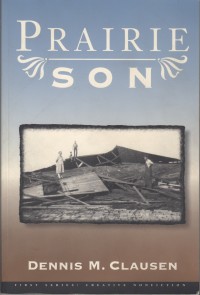Prairie Son by Dennis M. Clausen (1999. Mid-list Press. ISBN 0922811393)
Ever wonder what it would be like to be utterly and totally alone in the world? Lloyd Clausen, the roustabout, laboring, job-changing father of the author of this terrific diary-turned-memoir-turned-novel lived that life during much of the 20th century. Set on the southwestern prairie of Minnesota (near Morris, though the closest town in the story is Alberta (pop. 142)), the author asked his father, as the old man was dying from cancer, to jot down stories of his youth and upbringing. Given that Lloyd Clausen had been adopted from an orphanage, was raised by what Dennis perceived to be a loving and devoted mother (his paternal grandmother), the intent of the exercise was to create a traditional family history. But when Dennis found yellow legal pads filled with his father’s scribbling after Lloyd’s passing, the author knew he had the makings of something far more intriguing and gut-wrenching than a lovingly portrayed narrative.
What took place after 1922 in the Clausen home was physical abuse and an utter and complete lack of love: That’s the environment that young Lloyd was dropped into by the Stevens County Human Services folks when the Clausens adopted the boy as an infant. Early in the story, we are provided a clear vision of what hell would look like for a scared, unloved, unwanted orphan. Lloyd’s (and the author’s) view of Lloyd’s parents softens a bit over time, not so much because the Clausens actually change due to the intervention of morality but more because outsiders, who learn of Lloyd’s plight (and his parents’ behavior towards him), step in to lend the boy love and, at times, protection. These characters range from illiterate farmers who protect Lloyd from a vengeful local minister to the neighborhood bully, who seeing himself in the down and out face of Lloyd Clausen, takes Lloyd’s part against a mob of nasty town boys.
The scene involving the reverend seeking Lloyd’s expulsion from the country schoolhouse is a memorable one:
“I was standing in the middle of the road,” he began in a halting and nervous tone of voice, “when Lloyd threw a rock at me…” Marcus continued to look in my direction for several seconds, staring directly into my eyes. Then he looked back at the school board. “No,” he said, “that’s not the way it happened at all. Lloyd and I were playing a game. It was my idea…”
“It was not your idea!” Reverend Reese shouted. He started to stand again, but several members of the school board glared at him, and he sat down.
“It was my idea,” Marcus repeated…”I threw a rock at Lloyd’s shoes. He threw one back at my shoes. We did this several times. Then one of the rocks hit something in the road, flew up, and hit me above the eye. It was an accident…”
“He’s trying to protect his friend!” Reverend Reese yelled…
“Reverend Reese,” the chairman said firmly, “I really think you had better sit down.” Then he glanced at the other school board members, all of whom nodded in his direction. “I don’t think we need to hear from anyone else regarding this matter.”
The members of the school board huddled together briefly at the front of the room. They returned to the table. “Lloyd,” the chairman said warmly, “the members of the school board apologize that you were suspended…You are innocent of the charges…”
Then he turned to Reverend Reese and said, “As for you, Reverend Reese, if the school board ever again hears that you have tried to blame this incident on Lloyd, we will go to your church council, and we will tell them the whole story. You tell people the truth about what happened to your son, or you will be looking for a new parish.”
The point of this scene is twofold: It establishes that there were role models in young Lloyd’s life who stepped in to assist him in times of trouble. But it also establishes the gritty truth about his father’s lovelessness: Lloyd’s father never said a word to the school board or the reverend in defense of his son. Why? Because as we learn, the boy who grew up to be Lloyd Clausen was adopted not as a son but as a hired hand; a boy to grow into a man and work the family farm as a colt grows into a stallion to pull a plow. The bitterness and bleakness of this awful reality is tempered by folks like the school board and Delores, Lloyd’s cousin (also adopted but treated as a natural child by her parents) who show Lloyd love and kindness along his journey to adulthood.
My only criticism of the book is that it is a bit disjointed. The format, short vignettes that don’t always flow together in a cohesive narrative, often read more like excerpts from a diary than a sell-paced memoir. Still, the story has heart and is well written: So much so, I can guaranty you won’t want to put it down and that you will shed a tear or two at the book’s conclusion.
4 1/2 stars out of 5.




Hi, Mark. Wondering if you might be able to tell me more about the actual time period/location in which the book is placed? Thanks!